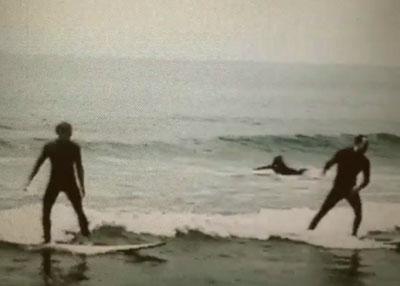‘Endless Summer’ or Endless Bummer?

The film “Kook Paradise” started as an inside joke between two veteran surfers who live, surf, and dodge the crowds at Ditch Plain in Montauk.
“Some people have called it malicious, but it’s not. We are just revealing something that’s there. The tag line is ‘Remember, it’s all just a dream,’ ” said Danny DiMauro, who, with Tin Ojeda, wrote, filmed, edited, and narrated “Kook.” Mr. Ojeda chose the music, beginning with the theme from “The Endless Summer.”
They plan to debut the film on Aug. 25 at Melet Mercantile, the space next to Moko Taxi just before the railroad tracks where Industrial Road meets Second House Road in Montauk. Show time is 9 p.m. Come one, come all.
Yes, the film will compromise some egos, but the documentary footage of less-than-accomplished surfers doing their pre-session stretching, yoga, and arm pinwheeling, all in preparation to attack slow, knee-high waves, escapes condescension. The filmmakers have succeeded in revealing the slapstick that occurs when powerful fantasies fall short. If the kooks look foolish, so do we all in the grand scheme of things.
“There was this obsession with stretching, and for tiny waves,” Mr. Ojeda said. “I said to Danny, ‘This summer is going to be Kook Paradise.’ That’s how it started. I went around with my cellphone getting footage of stretching. I said we should make a 20-minute trailer. Danny started writing. We did one vignette and it kept growing.”
“A kook is someone who lives in a fantasy,” Mr. DiMauro said during an interview last week at Mr. Ojeda’s studio, a quick walk from Ditch. The fantasy in question was, Mr. DiMauro said, that “Ditch Plain is a surfing mecca.” It may be surf city, the prime destination for city surfers on safari, he said, but it was not, is not, and will never be a world-class surf spot like Malibu, the iconic West Coast break.
The movie’s humor is based on the underlying truth that the popular spot’s lack of good, consistent surf has not prevented Ditch from becoming the kind of magnet for beachy hipness, celebrity, and merchandizing that Malibu was in the 1960s. This explains the tongue-in-cheek “paradise” part of the film’s title.
The “kook” part is more painful perhaps. The word derives from the Hawaiian “kuk” with a long “U” between the “Ks.” Kuk comes from Kukai, the word for shit. When Hawaiian surfers saw someone with a beginner’s squatty stance, they would say he’s taking a kukai. He’s a kuk.
Now, if you take the two aforementioned elements and combine them with Mr. Ojeda’s editing and Mr. DiMauro’s Bruce Brown style of narration, Mr. Brown’s classic “Endless Summer” becomes a side-splitting “Endless Bummer” from which no one, not even the filmmakers, escapes.
“It’s funny,” Mr. DiMauro said. “People come here with an ‘Endless Summer’ mentality. It’s not an accident we did it in the syle of that era.”
He was referring to the 1950s and ’60s, the era known as the birth of modern surfing promoted by Olympic swimmer Duke Kahanamoku and made possible by the transition from heavy wooden boards to lightweight fiberglass models. It didn’t hurt that California had by then become a short hop from Hawaii by jet, and Malibu — one of the premier point breaks in California — was only a stone’s throw from Hollywood.
It wasn’t long before the proud Hawaiian sport of kings was Hollywooded into “Beach Blanket Bingo,” “Ride the Wild Surf,” and “Gidget.”
“Surfing has always had peaks and valleys,” Mr. DiMauro said. “Two things are responsible for Ditch Plains’ transformation into a kook paradise,” he said, “the rebirth of the longboard and the online revolution.” He explained that would-be surfers are now able to first check surf conditions online, and swarm the highlighted breaks. Then, because longboards (and standup paddleboards) have greater flotation — an advantage to beginners — they’re able to paddle into the lineup despite lagging far behind on the learning curve.
“There are 30 and 40-year-olds, midlife groms,” he said, “grom” being surf lingo for neophyte surfer. Traditionally, “grom,” or “gremmy” status was applied to those who caught the surfing bug in their early teens.
The film stars a few local stalwarts including Lili Monahan, whose Ditch Witch food wagon (Mr. Ojeda calls it the “epicenter”) fuels the surfers at Montauk’s most popular beach. She is seen unwrapping a lollypop, dipping it in Costa Rican hot sauce, rewrapping it, and giving it to a child.
Jim Goldberg, ding repairman to the stars, also makes an appearance. In one scene his darker side takes a chainsaw to a board he has agreed to repair. Despite the damage he wreaks, the kook doesn’t blink at the $1,500 bill.
Remember, it’s all just a dream.
_
Posting comments has been disabled for this article.
